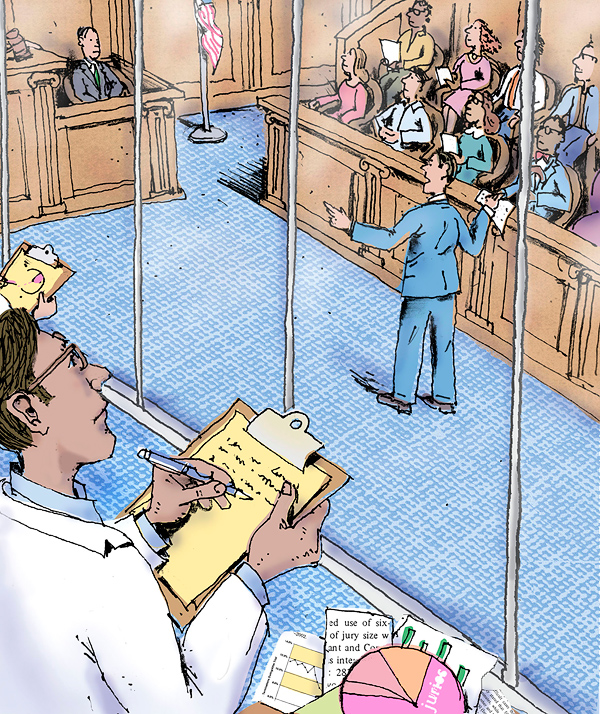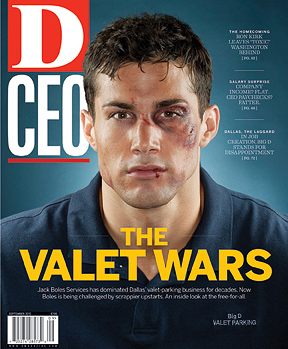Bloom has a state-of-the-art mock courtroom—complete with jury box, witness stand, judge’s bench, and counsel tables—at his North Dallas office to complete what he calls the “legal laboratory” approach. Attorneys and clients can monitor the courtroom “testing” from a viewing room behind one-way glass, and observe the “deliberations” conducted in deliberation rooms that are wired for video and sound.
A full-blown mock trial runs an estimated $15,000 to $30,000, with those conducted out of town running approximately $10,000 to $15,000 more. Whether it’s a high-stakes commercial litigation matter in California or a patent infringement suit deep in East Texas, Bloom offers jury studies that are “done in the venue, or a surrogate, to provide a mirror in terms of the jury pool demographics, occupations, and educational attainment,” he says.
It’s an approach that has earned Bloom a 90 percent success rate between mock and real decisions, and garnered a loyal following as well. Pamela O’Brien, chief litigation counsel at Stewart Title, says that Bloom and Bennett “excel at taking a scientific approach in coming up with a jury pool that mimics the demographics of our actual jury pool, and they help us outline our case by categorizing what we should ask prospective jurors and by identifying what will resonate with jurors.” In short, O’Brien says, “they help us define our message and convey our message.”
The witness communication training alone cannot be underestimated. Bad deposition testimony by corporate witnesses is often used as leverage in settlement discussions, as well as a factor in assessing the risk of going to trial. Yet, as Bloom is quick to point out, “the vast majority of that bad testimony can be easily prevented.” Improving body language, the wording of responses to questions, and even the timing of how a witness answers can make critical differences in how he or she is perceived by a listening audience. Remaining true to the themes of the case, and emphasizing what needs to be emphasized without being deemed repetitive, is also vital, according to Bloom.
Lessons from “Neurolaw”
A great deal of preparation goes into getting to hear what a jury thinks of your case. As Bennett points out, “The challenge for us is integrating the data that we collect into the decision-making aspect of each case.”
Bennett’s academic pedigree includes a master’s degree in educational psychology, human development, and communication from Texas Tech University, and she incorporates lessons from the emerging area of “neurolaw”—a marriage of cognitive neuroscience and traditional psychology that studies juror bias and decision-making—into her work. This can take the form of advising clients about attention spans and short term/long term memory issues for jurors, or even when to change topics.
“What attorneys and CEOs forget is that they’re not trying the case to a jury of their peers: they’re trying it to real, everyday people,” according to Bennett. The commonly held belief of “since you have deep pockets, you’re going to lose” simply isn’t true, she says.
Understanding and utilizing a more scientific approach enables Bloom and Bennett to take the guesswork out of jury outcomes. Likening jurors to icebergs, Bloom points out that what lies unseen below the water—the attitudes, life experiences, and predispositions—“are more predictive to the outcome of a case.”
All of this data accumulation, analysis, and overall preparation pays off, says Bloom. “Mock jury research serves as a reality check,” he says. “If you’re thinking one way about your case, and you find out you were wrong, wouldn’t you rather find out from a mock jury than the real one?”
Bloom’s most recent success story illustrates the importance of such preparation. Famed trial lawyer Rusty Hardin called on Bloom Strategic Consulting for help in successfully defending baseball legend Roger Clemens from charges of lying to Congress. By analyzing how strengths and weaknesses of the case would play to typical members of the jury pool, well ahead of the actual trial, Bloom says, Hardin and his trial team “were better focused to prepare for success, rather than just prepare for trial.” The result? Clemens was acquitted on all counts.






